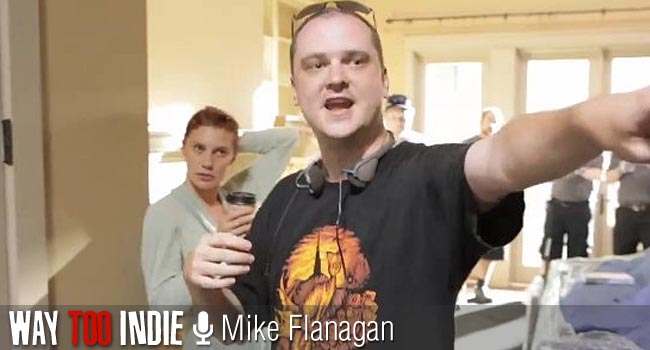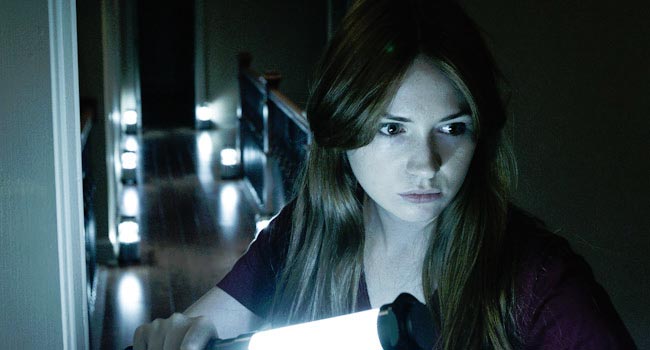Interview: Mike Flanagan of Oculus

Last Sunday TIFF’s Midnight Madness program unveiled the world premiere of Oculus. Mike Flanagan, whose last film Absentia was a great understated horror film, finds himself working with a bigger budget and cast this time around, including Doctor Who’s Karen Gillan and Battlestar Galactica’s Katee Sackhoff.
The story, much like Absentia, deals with an ancient evil. This time it’s a mirror that has a history of destroying its owners over several centuries. Gillian plays Kaylie, who is convinced her parents died as a result of the mirror, who teams up with her skeptical brother (Brenton Thwaites) to destroy the mirror once and for all.
Oculus is a rare sight in American horror today. It’s original, and it knows the power of telling an excellent story. I was able to briefly chat with director Mike Flanagan the day after its premiere. He went over the origins of the film’s story, the troubles of finding the right location for his film, and why ancient evil terrifies him.
Oculus is currently seeking distribution, but at the moment it appears likely that it will strike a deal for a wide U.S. release in the near-future. The film will play once more at the Toronto International Film Festival this weekend. More information can be found here.
How’d the premiere go last night?
It was overwhelming. I think it went great. I was pretty overwhelmed all night so I don’t know for sure how it went, but it seemed really great. I’ve never had the experience of sitting in an audience and feeling like they were connecting to a movie so much. The enthusiasm of the Midnight Madness audience is always so high that it was awesome. I don’t know if I’ll ever have [that kind of screening] again.
You originally made Oculus into a short film several years ago, but when did you originally come up with the idea for the mirror and story itself?
I think it was in 2003. A buddy of mine [Jeff Seidman] and I were talking about how reflections aren’t ever accurate. Every mirror has its flaws, and what we perceive as reality along with our own mental images are backwards. I was really fascinated by the idea that we’re very quick to accept something as reality that isn’t. There’s also the Jewish custom of covering mirrors after someone dies so the spirit can’t come back into the world, and looking at them as a gateway terrified me. It was something that I didn’t think had really been explored very much within the genre. A tiny handful of movies had dealt with mirrors so I thought “Let’s try to do something a little different.”
There’s certainly a budgetary concern, but I really like contained horror films like The Thing. Once you establish a location everybody gets comfortable, and that means you can deal with the tension and characters and not have to worry. Every time you change the location in a movie everybody has to reset a little bit. Doing contained horror is really exciting to me anyway, and for this movie in particular we didn’t have a lot of time or all the money in the world, so it also helped us practically. I can’t imagine the story working if we expanded our locations any further.
You planned Oculus as an anthology of short films originally. Do you still want to keep making more films about the Lasser Glass?
I would love to keep telling stories about this mirror. The beauty of having an artifact like this which has such a long history is that you can literally pick it up and put it anywhere. It’ll interact with people differently depending on who they are, and that gives me endless possibilities for writing. I think I could write about this mirror for the rest of my life, it’s too fun. We’ve called it a “portable Overlook Hotel” and I love that about it. I love that we can just pick this thing up and drop it in a whole other movie if we want to and see what happens.

How was the location scouting process for the house, and how was working in Alabama for the shoot?
Alabama was actually wonderful to us. The Alabama film office was just phenomenal. We scouted for a week. It was really hard to find the house. We needed a house that was large enough to fit our crew, and we needed something we could completely empty out for the present storyline and re-furnish for [the flashbacks]. There was a lot of action that was specific to the geography to the house: upstairs, the landings. We’d find these houses that were 80% right and it was like “This will work for everything but this one critical scene” and we couldn’t let that go.
A family was living in [the house we chose], so we had to put them in a hotel. They were really funny. When they finally read the script [while we were shooting in the house] they got so uncomfortable that they asked us to come in afterward and do some kind of cleansing to their house. They were afraid we were going to leave residual spirit energy behind. We had to kind of assure them that the history of the mirror they read is completely made up, it’s just a fibreglass mirror we made. It was neat to see the family walking through the space after it was transformed and getting into it.
Watching Absentia and the Oculus short I noticed that your films have an element of folklore to them. There’s an established history, which makes things even scarier because of how much worse the stakes are for the characters. Is that something you personally find scary?
Absolutely. I think what a mythology does is it creates a sense of dread and expectation. I love dealing with things that have a history and a story to tell. Storytelling around the campfire kind of stuff. That has always scared me more than trying to dive into a story and be expected to kind of pick up and build your own mythology around what’s there. I also think that when you’re dealing with ancient evils there’s this impression that they’ve been around so long [the characters] aren’t going to win because someone would have by now. That scares me the most, when the characters are outmatched from the start. That was very true in Absentia, they never stood a chance. In this one what’s neat is that Kaylie has a plan that can work, she can actually pull this off. Pitting an ordinary young woman against an ancient evil is quite a fight.
In the first act Kaylie’s brother argues with her about the possibility that most of her theories about the mirror might be in her head. Were you hoping that viewers weren’t going to be sure what to believe at first, or did you want to establish the mirror as evil from the beginning?
We were hoping to have at least a little bit of ambiguity. I really enjoyed playing with that in Absentia. Being a scientist, and an avid fan of science, I love the idea that we don’t have to accept at face value what we’re shown. There could be all sorts of other explanations. That was a theme I loved doing in my last movie, but I think we give more answers in this one [than Absentia]. I wanted to sustain that [ambiguity] as long as I could.
What can you tell us about your new project Somnia?
Somnia is a passion project of mine. All of my movies have been leading up to that one. We have Katee Sackhoff back which is just amazing. She’s phenomenal, and I love working with her so much. The story is another kind of intense and emotional family story. The supernatural elements are very different this time because they’re centered around a little boy whose dreams, and eventually nightmares, manifest physically around him. It’s going to be the most challenging thing I’ve had to do so far visually. I think if we pull it off it’s going to be a really emotionally intense experience, and that excites me more than anything.
